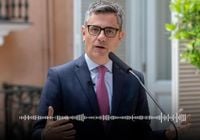On April 16, 2025, a tense interrogation unfolded at the Moncloa Palace as Minister Félix Bolaños testified regarding the hiring of Cristina Álvarez, an advisor to Begoña Gómez, wife of Spanish Prime Minister Pedro Sánchez. The session, lasting nearly three hours, was presided over by Judge Juan Carlos Peinado, who is investigating allegations of influence peddling and corruption against Gómez.
During the questioning, Judge Peinado adopted an unusually aggressive tone, frequently interrupting Bolaños and accusing him of providing evasive answers. According to recordings of the proceedings obtained by RTVE, the judge expressed frustration at Bolaños’ demeanor, suggesting that his smiles during the testimony were inappropriate. "I don’t know what your smile is about," Peinado remarked, to which Bolaños responded, "Your interrogation is surprising me, that’s why I smiled." This exchange highlighted the mounting tension in the courtroom.
The core of the investigation centers on the legality of Álvarez's appointment in July 2018 as Director of Programs of the General Secretariat of the Presidency. Bolaños, who held the position of Secretary General of the Presidency at the time, stated he had met Gómez only about 10 to 12 times and Álvarez even less frequently, estimating just two or three encounters, primarily at political events.
When pressed about the specifics of Álvarez's role, Bolaños maintained that he was never her superior and was unaware of her daily tasks. "I never was her boss. She was never my subordinate, and I didn’t know what tasks she performed on a daily basis," he asserted. This claim drew skepticism from Judge Peinado, who found it "incomprehensible" that a minister could be unaware of the organizational structure concerning an advisor to the Prime Minister's wife.
The judge’s inquiries also delved into the appointment of Alfredo González, the Deputy Secretary General of the Presidency, who had been involved in the hiring process. Bolaños recalled that González was likely the one who proposed Álvarez, but when asked to affirm this confidently, he hesitated, citing the time elapsed since the appointment—seven years. This hesitation prompted Judge Peinado to question Bolaños' credibility further, stating, "Is it a belief or are you sure?"
In a particularly charged moment, Peinado confronted Bolaños about his lack of knowledge regarding Álvarez's direct supervisor, Raúl Díaz Silva, the coordinator of Palace staff. "It’s absolutely notorious at this moment," Bolaños replied, defending his position by stating that he was not involved in the day-to-day operations of Álvarez’s role.
The investigation into Gómez began a year prior, following a complaint by the anti-corruption group Manos Limpias, which alleged that she had improperly accessed two master’s degrees and a professorship at the Complutense University of Madrid, leveraging her status as Sánchez's wife. As the inquiry expanded, it now encompasses the hiring of Álvarez, who reportedly assisted Gómez with both professional and private matters.
Throughout the interrogation, Judge Peinado expressed frustration at Bolaños’ responses, repeatedly stating that he was not asking for opinions but for facts. "It’s not a matter of beliefs; it’s about testimonies that witnesses must provide," he insisted. The judge’s aggressive line of questioning led to a suspension of the session, with Peinado suggesting a potential confrontation between Bolaños and González to clarify discrepancies in their testimonies.
Bolaños defended the role of assistants for the spouses of government leaders, stating, "All wives of government presidents have had assistants for the institutional duties they are assigned." He emphasized the necessity of such positions, arguing that the presence of a single assistant in this case should not be viewed as unusual.
As the interrogation continued, the judge ordered that Bolaños be shown the previous testimony of González. After reviewing it, Bolaños stated that he generally agreed with González's account, which described the appointment of Álvarez as legal and appropriate. This assertion, however, did little to appease the judge, who seemed increasingly skeptical of Bolaños' credibility.
The tension reached a peak when the judge threatened to suspend the interrogation entirely, stating that he would need to conduct a new session if Bolaños continued to provide non-committal answers. "I have to insist, this is a judicial setting, and your responses must be straightforward," Peinado admonished.
In the aftermath of the session, Bolaños reiterated his surprise at the nature of the interrogation, emphasizing that he was there to provide testimony, not to be treated as a suspect. The ongoing investigation into Gómez and her connections continues to attract public and media scrutiny, with the implications of this case resonating throughout the political landscape of Spain.
The implications of this case are significant, as it raises questions about the intersection of personal relationships and professional appointments within the highest levels of government. As the investigation unfolds, many are watching closely to see how it will affect the Sánchez administration and the broader political context in Spain.




